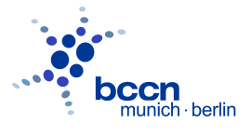BCCN Workshop on Neuromorphic Engineering 2014

Brain-like Computation in Hardware: Advances in Neuromorphic Engineering
The field of Neuromorphic Computing investigates principles of computation in the nervous system and methods for implementing them in full-custom hardware/software co-designed technical systems. The neuromorphic research goal is two-fold: (a) advance our understanding of how large scale neuronal circuits perform coherent computation, and (b) push current engineering technology beyond today’s von-Neumann computing architectures.
Various implementations of neuromorphic hardware systems, ranging from single synapses to large scale models, have been developed in recent decades. Examples include sensory devices (e.g. silicon retinas or cochleae), analog VLSI chips and massively distributed digital systems for real- or accelerated-time spiking neural networks. En route to future applications of neuromorphic computing the current challenge lies in the identification and implementation of functional brain algorithms in a multi-disciplinary approach.
Various neuromorphic computing systems exist that the computational neuroscience community could use to model observed data, for real-time analysis of recordings, or even for closed-loop feedback during experiments. Many such neuromorphic approaches have recently reached sufficient maturity to be used by non-experts for individual projects. Similarly, several neuromorphic sensors and large-scale neuromorphic computing systems start finding their way into industry or into large-scale research projects such as the HumanBrainProject, the US Brain Initiative, or the Qualcomm Zeroth Processor.
This workshop features speakers from groups across Europe who present current state-of-the-art of neuromorphic technology, examples of applied neuromorphic computing, and future applications in computational neuroscience, robotics and technology. The workshop intends to serve as nucleus to foster future collaborations between research in computational neuroscience and (applied) neuromorphic engineering.
During the workshop we will provide ample time for a poster session, discussions and live demonstrations of small-sized neuromorphic systems.
The workshop will take place on September 2, 13:30 - 17:30 & September 3, 9:00 - 12:30.
Please register for the Bernstein Conference 2014/Workshops.
Invited Speakers and tentative schedule
| Name | Affiliation | Timeslot | Title of Presentation |
|---|---|---|---|
| Organizers | Tue,13h30-13h40 | Welcome & Intro | |
| Ryad Benosman | Institut de la Vision, Paris, FR | Tue,13h40-14h20 | Neuromorphic event-based time oriented vision: A framework to unify comp. and biological vision |
| Alejandro Linares-Barranco | University of Sevilla, SP | Tue,14h20-15h00 | Spike-based Processing Building Blocks for Neuromorphic Robotic Systems |
| Jörg Conradt | TU München, DE | Tue,15h30-16h10 | Neuromorphic Technology: Sensors and Computation |
| Poster + Demos | Tue,16h10-17h30 | ||
| Steve Temple | University of Manchester, UK | Wed,9h00-9h40 | SpiNNaker - a Real-Time Neuromorphic Computing Platform |
| Thomas Pfeil | Facets/BrainScales Univ.Heidelberg DE | Wed,9h40-10h20 | A neuromorphic network for generic multivariate data classification |
| Giacomo Indiveri | Univ. Zürich, ETHZ, CH | Wed,10h50-11h30 | Neuromorphic engineering: from brains to silicon implementations |
| Paolo del Guidice | University of Rome, IT | Wed,11h30-12h10 | Neuromorphic systems between 'silicon neuro-physiology' and neuroprosthetics |
| Organizers | Wed,12h10-12h30 | Wed, 12h10-12h30 |